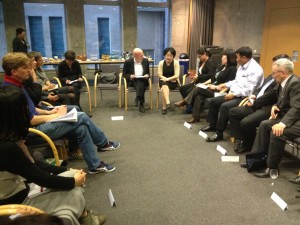Search Results for Tag: press regulation
Degrees of freedom: Shaping the internet’s future
 The fourth Freedom Online Conference Free and Secure Internet for All will be held in Tallinn, Estonia, from April 28th to 29th 2014 (#FOC14). This conference will bring together high-ranking representatives from the 22 member states of the Freedom Online Coalition – among them the US, Germany, Brazil and host Estonia. They will join up with a large number of civil society actors ranging from NGOs promoting internet freedom to large companies with a vested interest in all things internet like Google.
The fourth Freedom Online Conference Free and Secure Internet for All will be held in Tallinn, Estonia, from April 28th to 29th 2014 (#FOC14). This conference will bring together high-ranking representatives from the 22 member states of the Freedom Online Coalition – among them the US, Germany, Brazil and host Estonia. They will join up with a large number of civil society actors ranging from NGOs promoting internet freedom to large companies with a vested interest in all things internet like Google.
DW Akademie’s Holger Hank highlights the four most pressing issues from the perspective of media freedom.
![]() read more
read more
In dialogue with Mongolian media
 A list of forbidden words; newspapers influenced by politicians; and in the capital Ulan Bator, Mongolian journalists refrain from criticizing their colleagues because all journalists know each other.
A list of forbidden words; newspapers influenced by politicians; and in the capital Ulan Bator, Mongolian journalists refrain from criticizing their colleagues because all journalists know each other.
At a recent DW Akademie Media Dialogue in Berlin, a group of visiting journalists, editors and media experts from Mongolia gave an insight into media development in their country.
German journalists attending were keen to find out about press freedom in Mongolia; who exactly owns private media; and, what progress is being made towards press industry self regulation.
It was also another opportunity for the visiting Mongolian journalists to compare journalistic practices and media regulation between Germany and Mongolia.
Following the end of the Soviet era, Mongolia introduced a number of laws to make reforms in public broadcasting, freedom of information and to prevent media censorship.
In 2010, Reporters without Borders ranked Mongolia in its Press Freedom Index at 76. This year Mongolia was ranked 98.
One topic that generated a lot of discussion was the so-called “list of forbidden words”. Journalists explained how Mongolia’s Communications Regulatory Commission (CRC) is under strong political pressure to make media organizations use software to filter or hide “forbidden words” in online reader comments that are critical of government or insulting.
To explore how Mongolia’s media is developing, onMedia spoke with Munkhmandakh Myagmar, Executive Director of the Mongolian Press Institute; and, Tserenjav Demberel, Executive Director of Transparency Foundation Mongolia, and a blogger on media issues.
![]() read more
read more




Feedback